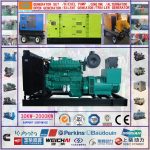Ensuring Continuity with Diesel Generators for Emergency Backup

Introduction
In today's fast-paced world, uninterrupted power supply is essential for businesses, hospitals, data centers, and other critical facilities. Power outages can result in significant financial losses, disruption of services, and even jeopardize safety and well-being. To mitigate the impact of power failures, many organizations rely on diesel generators for emergency backup power. In this article, we will explore the importance of diesel generators as a reliable source of backup power, their key features, benefits, maintenance requirements, and best practices for ensuring their optimal performance.
Importance of Diesel Generators for Emergency Backup
Diesel generators play a crucial role in ensuring continuity of operations during power outages or grid failures. Unlike renewable energy sources such as solar or wind power, diesel generators can provide instant backup power without relying on external factors like weather conditions. This makes them ideal for use in critical applications where uninterrupted power supply is non-negotiable.
In the event of a power outage, diesel generators can kick in automatically or manually to supply electricity to essential equipment and systems, allowing businesses to continue operations, hospitals to provide life-saving care, and data centers to maintain connectivity. Without a reliable backup power source like a diesel generator, organizations risk facing downtime, loss of revenue, damage to equipment, and compromised safety and security.
Key Features of Diesel Generators
Diesel generators are known for their robustness, reliability, and efficiency, making them a popular choice for emergency backup power. Some key features of diesel generators include:
1. Power Output: Diesel generators are available in a wide range of power outputs, from portable units suitable for small businesses to large industrial generators capable of powering entire facilities.
2. Fuel Efficiency: Diesel engines are more fuel-efficient than gasoline engines, providing longer run times and lower operating costs.
3. 300kw diesel generator for construction tools : Diesel generators are built to withstand heavy-duty use and harsh environmental conditions, making them reliable in emergencies.
4. Quick Start-Up: Diesel generators can start up quickly and provide power within seconds of a power outage, ensuring minimal disruption to operations.
5. Low Maintenance: Diesel generators require regular maintenance to ensure optimal performance, but they are generally low-maintenance compared to other backup power sources.
Benefits of Diesel Generators for Emergency Backup
There are several benefits to using diesel generators for emergency backup power, including:
1. Reliability: Diesel generators are known for their reliability and can provide continuous power for extended periods, ensuring uninterrupted operations during power outages.
2. Cost-Effectiveness: While diesel generators require an initial investment, they offer long-term cost savings through fuel efficiency and minimal maintenance requirements.
3. Versatility: Diesel generators come in various sizes and configurations to meet the specific power needs of different applications, from small businesses to large industrial facilities.
4. Rapid Response: Diesel generators can start up quickly and deliver power within seconds, minimizing downtime and ensuring continuity of operations.
5. Independence: Diesel generators do not rely on external power sources, making them a self-sufficient backup option for critical facilities.
Maintenance Requirements for Diesel Generators
To ensure the reliable performance of diesel generators during emergencies, proper maintenance is essential. Some key maintenance requirements for diesel generators include:
1. Regular Inspections: Conduct routine inspections of the generator, including checking for leaks, loose connections, and signs of wear and tear.
2. Fluid Checks: Monitor fuel levels, oil levels, and coolant levels regularly to ensure proper operation and prevent overheating or damage.
3. Load Testing: Periodically test the generator under load conditions to verify its capacity and performance.
4. Fuel Quality: Use clean and high-quality diesel fuel to prevent contamination and maintain the efficiency of the generator.
5. Battery Maintenance: Check and replace batteries as needed to ensure reliable start-up and operation of the generator.
Best Practices for Diesel Generator Maintenance
In addition to regular maintenance tasks, following best practices can help ensure the optimal performance and longevity of diesel generators:

1. Create a Maintenance Schedule: Develop a comprehensive maintenance schedule that includes routine inspections, fluid checks, load testing, and other preventive maintenance tasks.
2. Train Operators: Provide training to operators on the proper use and maintenance of diesel generators to prevent misuse and ensure safe operation.
3. Keep Records: Maintain detailed records of maintenance activities, repairs, and inspections to track the generator's performance and identify any issues early.
4. Work with Professionals: When in doubt or for complex maintenance tasks, consult with qualified technicians or service providers to ensure the proper care of the generator.
5. Plan for Emergencies: Develop an emergency response plan that includes protocols for generator failure, backup power sources, and coordination with utility providers in case of prolonged outages.
Conclusion
Diesel generators are indispensable for providing emergency backup power in critical applications where uninterrupted power supply is essential. Their reliability, efficiency, and quick start-up make them a popular choice for businesses, hospitals, data centers, and other facilities that cannot afford downtime. By understanding the key features, benefits, maintenance requirements, and best practices for diesel generators, organizations can ensure the continuity of operations and mitigate the risks associated with power outages. Investing in a diesel generator as a reliable backup power source is a proactive measure that can safeguard against potential disruptions and protect the safety and well-being of employees and customers.
